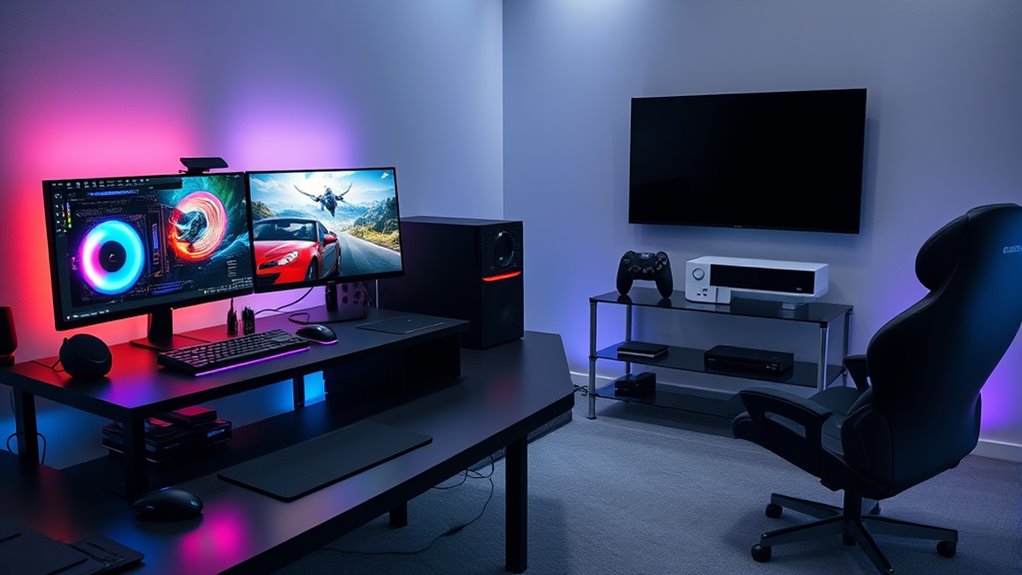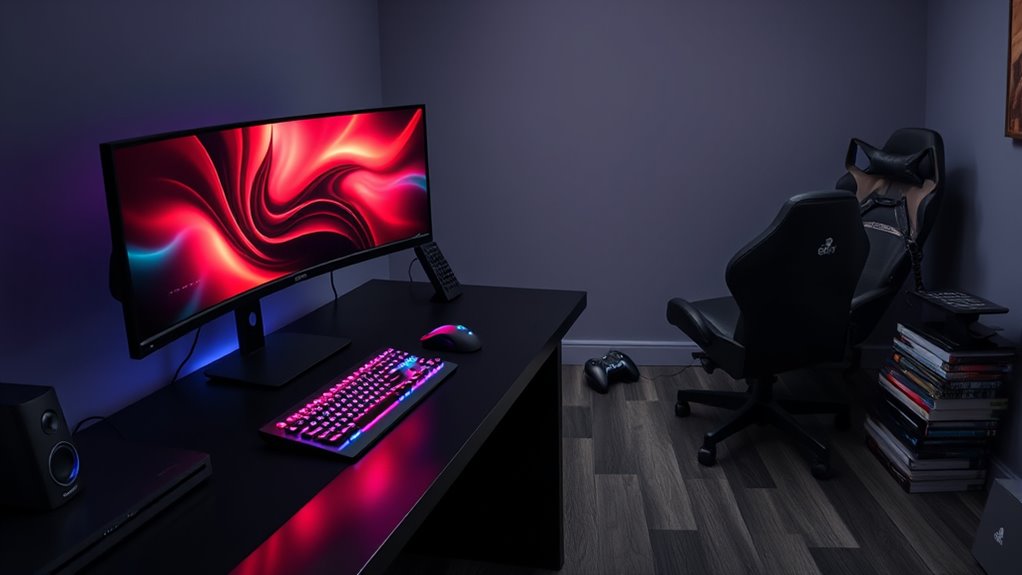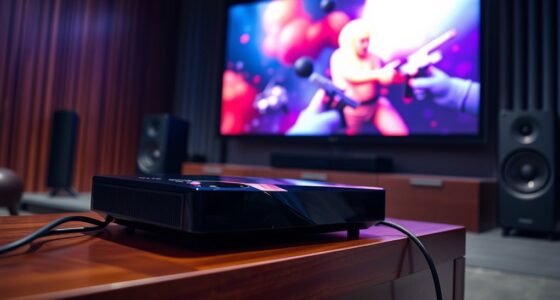When choosing a PC or console for gaming, consider if you value hardware customization, as PCs let you upgrade components and optimize performance, or if you prefer a hassle-free setup with consistent software, typical of consoles. PCs support a wider range of games and peripherals, while consoles are more affordable and easier to use. To discover which setup suits you best, explore the detailed differences and options available.
Key Takeaways
- PCs offer extensive hardware customization for better performance and visuals, unlike fixed console systems.
- PCs support a wider range of games and peripherals, providing more software flexibility than consoles.
- Consoles are ideal for quick, casual gaming with minimal setup, while PCs cater to modding and high-performance enthusiasts.
- Both systems benefit from high-quality displays, but display choices significantly impact visual experience.
- Your decision depends on valuing customization and software compatibility versus ease of use and affordability.

When choosing between a PC and a console gaming setup, it’s important to contemplate how each option aligns with your gaming preferences and lifestyle. One key aspect to consider is hardware customization. With a PC, you have the freedom to tailor your hardware components to fit your specific needs. You can upgrade graphics cards, add more RAM, or enhance storage, ensuring your system stays current and performs efficiently. This flexibility allows you to maximize your gaming experience, whether you prefer high-resolution graphics or smoother frame rates. Consoles, on the other hand, come with fixed hardware configurations. While they’re easier to set up and require less maintenance, they don’t offer the same level of customization. You play on a system designed by the manufacturer, which means fewer options for tweaking performance or upgrading parts over time.
Software compatibility is another critical factor. PCs generally support a broader range of games, especially indie titles and older classics, thanks to their open platform. Plus, PC gamers can often access multiple digital storefronts like Steam, Epic Games, or GOG, giving you a vast library of options. Additionally, PCs provide compatibility with various peripherals and software tools, such as mods or custom controllers, which can enhance gameplay and personalization. Consoles, however, tend to have a more streamlined and consistent software environment. Games are optimized specifically for the hardware, resulting in fewer compatibility issues. This consistency ensures that you can jump into a game without worrying about conflicts or setup problems but also limits your ability to customize or modify the gaming experience extensively.
Your lifestyle and gaming habits also influence which setup suits you best. If you prefer a hassle-free experience with minimal fuss, a console’s plug-and-play nature might be more appealing. It’s convenient for living rooms, quick sessions, and casual gaming. Conversely, if you’re passionate about tweaking settings, experimenting with mods, or building a high-performance rig, a PC offers the control and flexibility you crave. Keep in mind that a PC often requires a larger initial investment and ongoing maintenance to keep hardware up to date. Consoles generally cost less upfront and are easier to maintain, making them attractive for those who prioritize simplicity. Additionally, the contrast ratio of your display can significantly impact your visual experience, especially in darker scenes, whether gaming on PC or console.
Ultimately, the decision hinges on how much you value hardware customization and software compatibility versus ease of use and affordability. Both setups have their merits, but understanding these differences helps you choose the gaming system that best fits your preferences and lifestyle.
Frequently Asked Questions
Which Gaming Setup Offers Better Multiplayer Experiences?
You’ll find that PC gaming often offers a better multiplayer experience thanks to seamless cross-platform play, allowing you to connect with friends on different devices. The voice chat quality is usually clearer and more reliable, enhancing communication during gameplay. While consoles also support multiplayer features and voice chat, PC setups tend to provide more flexibility, better servers, and smoother integration for a truly immersive multiplayer experience.
How Do Upgrade Options Differ Between PC and Consoles?
You’ll find that upgrade options differ markedly between PCs and consoles. PCs offer greater hardware flexibility, allowing you to swap out components like GPUs or RAM easily. In contrast, console upgrade complexity is higher; manufacturers typically release new models rather than upgrade existing ones. Surprisingly, over 70% of PC gamers upgrade their hardware annually, while most console users stick with their original system for years, highlighting the flexibility advantage of PCs.
Are There Exclusive Games for PC or Consoles?
Yes, there are exclusive titles for both PC and consoles due to platform limitations. You’ll find games like Halo on Xbox and Uncharted on PlayStation, while PC offers titles like Age of Empires and Starcraft. These exclusives can influence your choice, as you might prefer a platform that hosts your favorite games. Keep in mind that some games also come to multiple platforms but may have timed exclusivity or special features.
Which Setup Is More Energy-Efficient?
Your setup’s energy efficiency depends on your choices. Consoles are like tiny energy-saving ninjas, consuming markedly less power during gaming sessions than PCs. PCs can be customized for better power efficiency with energy-efficient components, but generally, consoles use less energy overall. If you want to cut down on energy consumption and power bills, a console is your best bet, making it a more eco-friendly option for gaming.
How Do Customization Options Compare?
When it comes to customization options, you find that PC gaming offers greater hardware flexibility and aesthetic personalization. You can upgrade components like graphics cards, RAM, and storage easily, tailoring your setup to your needs and preferences. With a PC, you can also personalize your aesthetic with custom cases, RGB lighting, and decals. Consoles, on the other hand, limit customization mostly to software settings and limited cosmetic options, offering less flexibility.
Conclusion
Ultimately, choosing between a PC and console gaming setup comes down to your preferences. Whether you prefer the limitless customization of a PC or the simplicity of a console, remember that your gaming experience is your kingdom. Don’t settle for less—your setup should be as epic as the games you play. Whichever path you choose, embrace it fully and turn your gaming space into a legendary battlefield or throne room. The power is in your hands.















